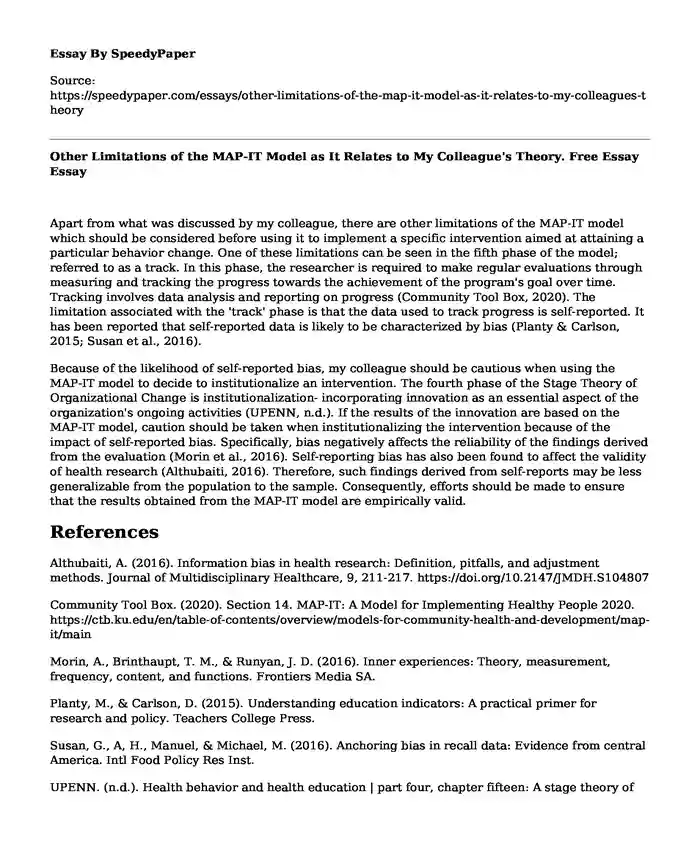
| Type of paper: | Research paper |
| Categories: | Knowledge Medicine Healthcare |
| Pages: | 2 |
| Wordcount: | 396 words |
Apart from what was discussed by my colleague, there are other limitations of the MAP-IT model which should be considered before using it to implement a specific intervention aimed at attaining a particular behavior change. One of these limitations can be seen in the fifth phase of the model; referred to as a track. In this phase, the researcher is required to make regular evaluations through measuring and tracking the progress towards the achievement of the program's goal over time. Tracking involves data analysis and reporting on progress (Community Tool Box, 2020). The limitation associated with the 'track' phase is that the data used to track progress is self-reported. It has been reported that self-reported data is likely to be characterized by bias (Planty & Carlson, 2015; Susan et al., 2016).
Because of the likelihood of self-reported bias, my colleague should be cautious when using the MAP-IT model to decide to institutionalize an intervention. The fourth phase of the Stage Theory of Organizational Change is institutionalization- incorporating innovation as an essential aspect of the organization's ongoing activities (UPENN, n.d.). If the results of the innovation are based on the MAP-IT model, caution should be taken when institutionalizing the intervention because of the impact of self-reported bias. Specifically, bias negatively affects the reliability of the findings derived from the evaluation (Morin et al., 2016). Self-reporting bias has also been found to affect the validity of health research (Althubaiti, 2016). Therefore, such findings derived from self-reports may be less generalizable from the population to the sample. Consequently, efforts should be made to ensure that the results obtained from the MAP-IT model are empirically valid.
References
Althubaiti, A. (2016). Information bias in health research: Definition, pitfalls, and adjustment methods. Journal of Multidisciplinary Healthcare, 9, 211-217. https://doi.org/10.2147/JMDH.S104807
Community Tool Box. (2020). Section 14. MAP-IT: A Model for Implementing Healthy People 2020. https://ctb.ku.edu/en/table-of-contents/overview/models-for-community-health-and-development/map-it/main
Morin, A., Brinthaupt, T. M., & Runyan, J. D. (2016). Inner experiences: Theory, measurement, frequency, content, and functions. Frontiers Media SA.
Planty, M., & Carlson, D. (2015). Understanding education indicators: A practical primer for research and policy. Teachers College Press.
Susan, G., A, H., Manuel, & Michael, M. (2016). Anchoring bias in recall data: Evidence from central America. Intl Food Policy Res Inst.
UPENN. (n.d.). Health behavior and health education | part four, chapter fifteen: A stage theory of organizational change. https://www.med.upenn.edu/hbhe4/part4-ch15-stage-theory-of-organizational-change.shtml
Cite this page
Other Limitations of the MAP-IT Model as It Relates to My Colleague's Theory. Free Essay. (2023, Apr 19). Retrieved from https://speedypaper.net/essays/other-limitations-of-the-map-it-model-as-it-relates-to-my-colleagues-theory
Request Removal
If you are the original author of this essay and no longer wish to have it published on the SpeedyPaper website, please click below to request its removal:
- Free Essay on Qualitative Data Analysis
- Free Essay on Customs and Border Protection Operations
- Free Essay: Ethics in Regards to Conducting Espionage, Intelligence, And Counterintelligence
- Essay Sample on The OPM Incident
- Free Essay. an Analysis of Medicare's Solvency Issues
- The Phenomenon of Interest; Advanced Directive - Free Essay
- Strategic Planning at Duke Hospital: SWOT Analysis for Quality Services - Paper Example
Popular categories




